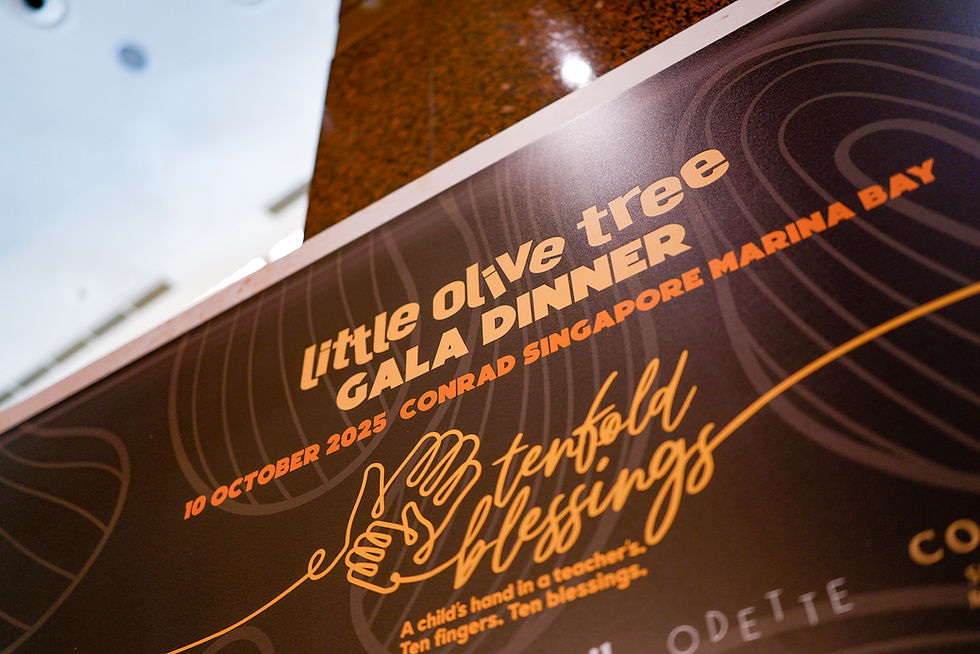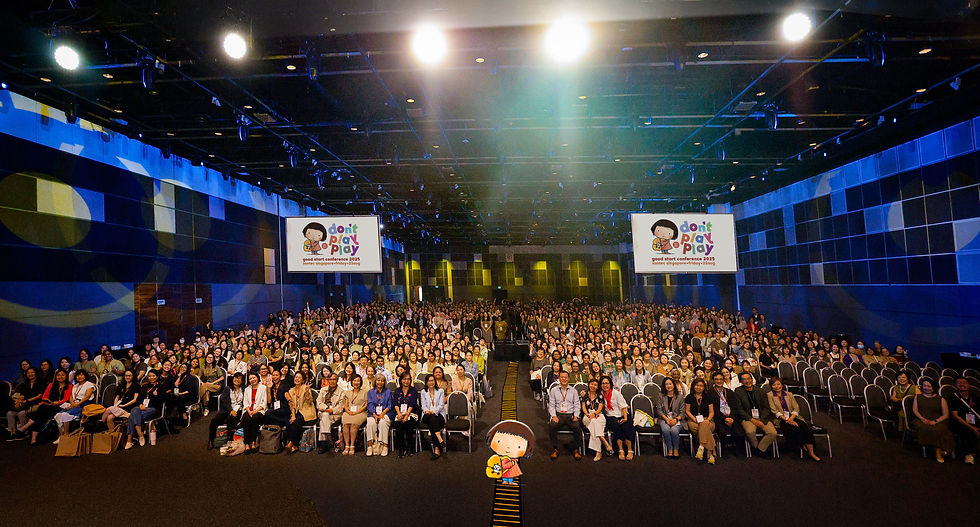Josiah's Journey: Trouble Worth Troubling For
- Mar 22, 2024
- 7 min read
Updated: Apr 3, 2024
We are currently seeking funding support for our Educational Support Programme (ESP). Click the button below to support our endeavour.
At Little Olive Tree by Presbyterian Preschool Services, we recognise that each child comes with their own sets of trouble. Caring for children is a messy and challenging process. Yet, we believe that as long as we are able, no child is too much trouble.
Every child is worth troubling for.
Today, we bring you Josiah’s Journey, the story about a 5-year-old boy in one of our childcare centres.
“Your child will end up in prison when he’s older.”
When Josiah was born, his parents named him Jevan, a Tamil name which means Bringer of Life. Soon after, his mother prayed that Jevan would grow up righteous and love God. Eventually, she gave him another name, Josiah, which is Hebrew for God supports and heals.
Being a wildly intelligent child, Josiah could already count to 20 the year he turned 2. Finding a preschool programme that would help him grow in his academic and cognitive skills seemed to be the best way forward for the family. Yet, their hopes were dashed when the first childcare they enrolled him advised them to look for another school as Josiah was not fitting in well due to his behaviour. His parents went on to look for another school thinking that they would only be turned away from one school.
Soon after enrolling into the 2nd childcare centre, they were told that his conduct and behaviour were too disorderly for that school. They were even told that if his behaviour does not change, he will end up in prison one day when he is older. This was both ironic and painful for them to hear. After all, they work for the Singapore Prison Service.
People are messy. Children are messy. We are sure all parents know that. But no parent would want to be told that their toddler’s conduct in preschool is indicative of their future.
All they needed were answers: how do we account for Josiah’s behaviour? Is there anyone who can help us?
Suspecting that their child may have behavioural or additional needs, they had sought consultation at the hospital and yet the assessment came back positive – their child has no special needs. This ought to have been good news, and but it was not good news to Josiah’s parents.
All they needed were answers: how do we account for Josiah’s behaviour? Is there anyone who can help us?
It was at this juncture when a friend suggested for them to approach Presbyterian Preschool Services at Pasir Ris 21 to give this childcare a go. They were naturally fearful that their son would be rejected again. But with their friend’s encouragement, they eventually came to meet with Ms. Margie Lee (the Principal of P21 in 2022) and Ms. Diana Brampy (the Educational Support Teacher) of Pasir Ris 21.
“We don’t know if we can help him. But let’s try.”
It was an emotional first meet. Josiah’s mother shared that he had already been turned away by two other childcare centres; that he is very intelligent but there were certain behaviours that would be triggered and he would be uncontrollable sometimes; that they had tried to seek a diagnosis from the hospital but it had returned naught, and that she was at her wit’s end.
Ms. Diana was not sure if she could help him, and typically children at his age seeking enrolment through the Educational Support Programme would already have received a diagnosis from the hospital. Unlike other children seeking enrolment for the ESP, Josiah had no paediatrician assessment that she could get more details from. Yet, she told Josiah's parents, "we don't know if we can help him. But let's try."
With 18 years of experience working with children with additional needs under her belt, Ms. Diana quickly noticed a few things about Josiah: he struggled to sit still, was antsy, highly anxious and struggled to express himself in full sentences but did so in clauses instead.
When he got frustrated and upset, he had the tendency to bite and inconsolably cry. He also did not seem to have bodily awareness and would launch himself on the floor or towards his teachers or friends when he was upset, a little bit like a bowling ball that did not have brakes.
He was also not toilet-trained yet, was a picky eater who struggled to eat school food and needed help with his fine motor skills (not being able to pick up the spoon well or hold the pencil properly).
She also noticed what may have eluded the other teachers who had previously cared for Josiah....She realised that once you got him interested in a subject matter, his ability to concentrate on the task at hand was incredible for his age. He was also a very avid reader who 'inhaled' books.
She also noticed what may have eluded the other teachers who had previously cared for Josiah. His inabilities and struggles aside, she also found him to be highly intelligent. She realised that once you got him interested in a subject matter, his ability to concentrate on the task at hand was incredible for his age. He was also a very avid reader who 'inhaled' books.
As Ms. Diana continued to shadow him, she found ways that she might be able to help Josiah. However, the most glaring obstacle he faced was his inability to self-regulate.
That is when she suggested to Josiah’s parents again that perhaps they should approach the hospital again for a diagnosis. However, this time, they had support from a team of teachers and a village that was willing to put in the work to document Josiah’s behaviour challenges. They were confident that they would be able to get a fitting diagnosis this time which would unlock the doors to the therapy services, on top of the strategies that Ms. Diana and the school teachers came up with. These therapy services, alongside the strategies, are crucial for Josiah’s growth and development.
Together with another church friend’s observations and records about Josiah, Ms. Diana wrote into the KK Hospital and managed get a diagnosis for Josiah. As it turns out, he is on the autism spectrum. Something his previous schools had missed as it was too much trouble to go through for him to get the proper diagnosis and help he needed.
As it turns out, he is on the autism spectrum. Something his previous schools had missed as it was too much trouble to go through for him to get the proper diagnosis and help he needed.
ESP: More than a “Programme”

With the diagnosis and observations from the time Josiah started enrolment in Pasir Ris 21, Ms. Diana continues to work closely with his parents to equip them with the skills they need to manage him. After all, what good is it for Josiah to only abide by the strategies while he is in school? The same strategies need to be applied across all the contexts that he is in, in school with Ms. Diana alone, in class with his classrooms, at home with his family or in church with his community etc.
Ms. Diana introduced visual rules and laid firm boundaries for Josiah, working closely with his class teachers and parents. With his diagnosis, Josiah could also start attending the Early Intervention Programme for Infants and Children (EIPIC) therapy.
Ms. Diana also discovered that if Josiah does not take his nap (i.e. he did not sleep well), his aggressive behaviour would escalate. On matters of nutrition, she also discovered that cutting out sugars from his diet also helped him to self-regulate better. Too much carbohydrates causes him to be overly jumpy and active.
It was also important that Josiah’s village rallied around him as a team. Josiah’s journey could not have transformed if any one of his pillar of support in his village did not adopt the same strategies that Ms. Diana was trying to equip everyone with.
The journey to the changes in his behaviour was not an easy one. However, changes were still observed.
No Longer Just Eating Bananas
Josiah joined Pasir Ris 21 at the end of 2022. By the end of 2023, he was toilet trained. He is also able to take off his own shoes and eat everything served in school. This is a remarkable transformation from the time when he was only willing to eat bananas, something he was comfortable with and used to.
Instances of biting and aggression towards his friends and teachers have also reduced by more than half compared to the past. Today, he can join his classmates for school field trips and has learnt to interact and care for his classmates without hurting them. In the off chance that he struggles to self-regulate, his classmates have also learned how to care for him by reminding him through the same visual aids and cues Ms. Diana introduced to his parents and his class.
Cultivating His Superpower: Reading
If you recall, Josiah could count to 20 the year he turned 2 and was also considered as very intelligent. Turns out, he has another superpower – reading! When the inclusive library in Punggol was opened, Ms. Diana encouraged his parents to bring him there every weekend no matter how far the distance, and he fell in love with reading even more.
The library became a magical place for Josiah. Today, he is one of the best readers in his class with a ginormous appetite for books and the knowledge and adventures that they promise.
Sitting in the Mud through the Unremarkable Days
Josiah’s journey from initially being labelled as a toddler-trouble maker who might end up in prison one day to where he is now has brought much cheer and encouragement to our hearts that children are trouble worth troubling for. We hope his journey and transformation brings you much hope as it did for us.
However, most of the children we encounter are not like Josiah. Yet, we just as we gamely tried and sat in the mud with Josiah till he grew, we continue to be committed to the children chose Little Olive Tree by Presbyterian Preschool Services to journey with them.
We are currently seeking funding support for our Educational Support Programme (ESP). Click the button below to support our endeavour.




Comments